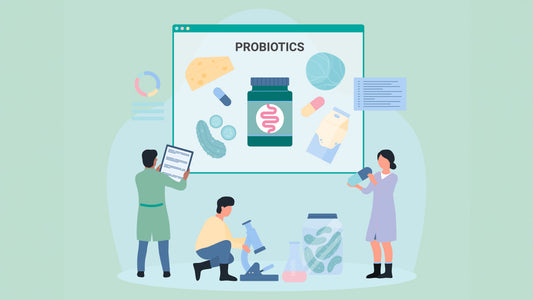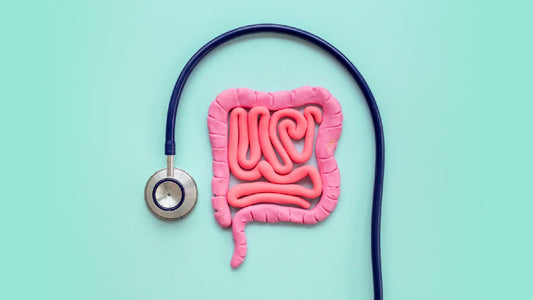We all know that fiber is essential. Whether consumed through diet—the ideal way—or extra supplementation, getting a minimum of 25g per day is critical for optimal physiological function.
Of the many fiber types, inulin is one we hear a lot more about. It’s a soluble dietary fiber found in foods like leeks, onions, asparagus, and bananas, and it confers health benefits for gut health, sleep, weight loss, and more.
But after consuming inulin, how long does it stay in your system and exert its benefits?
We’ve been asked the question, and we’re digging through the research. This article covers the basics of inulin—what it is, its benefits, and how long it stays in your body.
Let’s get started.
What Is Inulin?
If you’ve ever seen inulin, chances are it’s on the label of some sort of packaged food. Because it has a creamy mouthfeel and short-chain inulin (FOS) has a slightly sweet taste, it’s added to processed foods to help reduce sugar content—and sugar substitutes—in food and drinks.
And while inulin is inulin, whichever way you slice it, we’re talking about the supplement here that does more than just make food taste better—it actually confers several beneficial health outcomes.
But what actually is it?
Inulin is a prebiotic dietary fiber in several foods, including garlic, leeks, onions, bananas, Jerusalem artichokes, and asparagus. And although many foods contain dietary fiber, inulin is specific to a handful because it’s a different type of fiber than most—it’s called prebiotic fiber.
That is, a fiber that feeds the beneficial bacteria in the gut. While you’ve likely heard about the buzz-worthy probiotics, prebiotics are needed to keep the probiotics alive. That’s where inulin comes into the picture.
Prebiotic fibers offer excellent benefits for gut health and the bacteria in the GI tract because the human body doesn’t contain the enzymes required to break them down.
As such, they travel through the digestive system relatively intact until they reach the colon, where specific types of bacteria can digest them and use them as food.
As a byproduct of digestion, these microbes release short-chain fatty acids (SCFAs) like butyrate that offer several benefits for blood sugar, gut health, immune function, and more 1, 2.
Although several bacterial species in the gut ferment and utilize prebiotic fiber, inulin-type fructans have a specific colonic fermentation directed toward bifidobacteria, which break down and use inulin-type fructans thanks to the fructofuranosidase enzyme they possess 3. This strain has a competitive advantage in a mixed species environment like the gut.
But what’s so good about inulin, and why does it seem like the biggest health buzz since the discovery of probiotics and turmeric?
Many of the health benefits offered by inulin are thanks to its “prebiotic effect,” which allows the healthy bacterial species in the gut, the probiotics, to thrive and proliferate 4. But it also offers several other benefits, which we will discuss next.
Top 6 Benefits Of Inulin
1. Gut health
When it comes to gut health, probiotics are always touted as the best of the best—but we often forget that for bacteria to survive, they need food, too.
Prebiotics can boost the abundance of specific health-promoting bacterial species in your gut and increase their beneficial activities. Unlike probiotic supplements that introduce new colonies to the gut, prebiotics nourishes what’s already there.
Inulin helps promote the Bifidobacterium species that produce byproducts like short-chain fatty acids and vitamins. Bifidobacterium is known to be beneficial for 5:
- Maintaining gut pH via lactate and acetate production
- Producing metabolic byproducts that feed other bacteria
- Eliminating pathogens and opportunistic microbes
- Modulating the immune system
- Synthesizing vitamins (V vitamins, vitamin K)
Although Bifidobacterium is the primary feeder of inulin, other bacterial species use it too, and turn it into butyrate, a critical substance for gut health, as it serves as the primary source of fuel for colonocytes, maintaining the health of the gut lining, keeping the microbiome balanced, and reducing inflammation 6.
2. Constipation
Constipation can happen for many reasons, but lack of fiber is big. Because inulin is a soluble fiber, it absorbs water in the gut to form a gel-like substance that softens the stools and keeps them moving. As such, bowel transit time normalizes, and constipation is relieved.
A 2019 study published in Food Hydrocolloids found that just 10 grams of chicory root inulin daily improve stool frequency and consistency in middle-aged people with mild, chronic constipation 7.
However, while other studies confirm these findings, inulin doesn’t appear to improve symptoms of abdominal pain or bloating.
3. Diabetes
Thanks to its sweet taste and low sugar content, inulin can act as a sugar substitute without influencing blood sugar levels. A 2013 study of 49 women with type 2 diabetes found that inulin supplementation via functional foods reduced fasting blood sugar and HbA1c levels 8.
4. Weight loss
Looking to drop a few pounds? Boosting your prebiotic fiber intake could help. Because fiber isn’t digested, it may help increase satiation and curb hunger. Some research shows that inulin fiber may promote weight loss, especially in prediabetic people 9.
How? Although not completely clear, some evidence suggests a relationship between inulin and weight loss mediated by the gut—inulin promotes the proliferation of beneficial bacteria and the production of gut peptides that may suppress appetite 10, 11.
Related Post: Do Probiotics Help You Lose Weight? - A Complete Guide
5. Sleep
Fiber probably isn’t the first thing people think about when it comes to sleep, but there could be a link between inulin and sleep, although the evidence is weak.
The theory came from a 2017 animal study where a dairy-based prebiotic diet improved NREM sleep consolidation and supported beneficial REM sleep rebound following acute stress 12. But whether these benefits extend to humans isn’t known.
6. Calcium and magnesium absorption
One of the last benefits of inulin fiber is mineral absorption. It’s been shown to promote enhanced absorption of minerals in the gut, specifically calcium and magnesium 13.
Magnesium is critical for hundreds of biochemical reactions needed for nerve and muscle function, blood glucose, blood pressure, and more. But calcium is just as essential as it’s involved in bone health and nervous system function.
How Long Does Inulin Stay In Your System?
Generally speaking, most fibers stay in your system 24 hours or more, although times vary between individuals. One study found that cabbage fiber took anywhere from 38.9 hours to 61.1 hours to digest 14.
Although there’s no exact time for inulin, on average, on average, the process of digestion takes anywhere from 24 to 72 hours, but how long it takes for your body to digest and eliminate food depends on:
- What you eat
- How much you eat
- Current digestive issues
- Metabolism
- Physical activity levels
So, if you’re taking a prebiotic fiber supplement hoping it works magic within the hour, you will be waiting a while.
How Long Does It Take For Your Body To Get Used To Inulin?
As with any fiber supplement, you want to ease into it—going too hard too fast can lead to more trouble than you started with.
Some experts suggest that when starting inulin supplements, introduce no more than 2–3 grams per day for at least 1–2 weeks, slowly increasing your intake until you hit 5-10 grams daily. However, most studies suggest 10–30 grams per day if you want an effective dose.
If you experience any adverse side effects when starting an inulin supplement, they should fade with continued use.
But when using something like Performance Lab Prebiotic, you don’t have to worry about side effects—it’s an ultramodern 2-in-1 prebiotic and soluble fiber supplement for more reliable, natural, and comfortable microbiome support.

References
- Tan J, McKenzie C, Potamitis M, Thorburn AN, Mackay CR, Macia L. The role of short-chain fatty acids in health and disease. Adv Immunol. 2014;121:91-119.
- Silva YP, Bernardi A, Frozza RL. The Role of Short-Chain Fatty Acids From Gut Microbiota in Gut-Brain Communication. Front Endocrinol (Lausanne). 2020;11:25.
- Playne MJ, Crittenden R. Commercially available oligosaccharides. Bull Int Dairy J. 1996;313:10-22.
- Vandeputte D, Falony G, Vieira-Silva S, et al. Prebiotic inulin-type fructans induce specific changes in the human gut microbiota. 2017;66(11):1968-1974.
- O’Callaghan A, van Sinderen D. Bifidobacteria and Their Role as Members of the Human Gut Microbiota. Front Microbiol. 2016;7:925.
- Canani RB, Costanzo MD, Leone L, Pedata M, Meli R, Calignano A. Potential beneficial effects of butyrate in intestinal and extraintestinal diseases. World J Gastroenterol. 2011;17(12):1519-1528.
- Watson AW, Houghton D, Avery PJ, et al. Changes in stool frequency following chicory inulin consumption, and effects on stool consistency, quality of life and composition of gut microbiota. Food Hydrocoll. 2019;96:688-698.
- Dehghan P, Pourghassem Gargari B, Asgharijafarabadi M. Effects of high performance inulin supplementation on glycemic status and lipid profile in women with type 2 diabetes: a randomized, placebo-controlled clinical trial. Health Promot Perspect. 2013;3(1):55-63.
- Guess ND, Dornhorst A, Oliver N, Bell JD, Thomas EL, Frost GS. A randomized controlled trial: the effect of inulin on weight management and ectopic fat in subjects with prediabetes. Nutr Metab (Lond). 2015;12:36.
- AlBishi LA. Does Inulin Ingestion Reduce Visceral Fat Adiposity? Mini Review. Biomedical Journal. 2018;2(4).
- Cani PD, Joly E, Horsmans Y, Delzenne NM. Oligofructose promotes satiety in healthy human: a pilot study. Eur J Clin Nutr. 2006;60(5):567-572.
- Thompson RS, Roller R, Mika A, et al. Dietary Prebiotics and Bioactive Milk Fractions Improve NREM Sleep, Enhance REM Sleep Rebound and Attenuate the Stress-Induced Decrease in Diurnal Temperature and Gut Microbial Alpha Diversity. Front Behav Neurosci. 2017;10:240.
- Holloway L, Moynihan S, Abrams SA, Kent K, Hsu AR, Friedlander AL. Effects of oligofructose-enriched inulin on intestinal absorption of calcium and magnesium and bone turnover markers in postmenopausal women. Br J Nutr. 2007;97(2):365-372.
- Wrick KL, Robertson JB, Van Soest PJ, et al. The influence of dietary fiber source on human intestinal transit and stool output. J Nutr. 1983;113(8):1464-1479.















